
Let It Be is the twelfth and final studio album by the English rock band the Beatles. It was released on 8 May 1970, nearly a month after the official announcement of the group's public break-up, in tandem with the documentary of the same name. Concerned about recent friction within the band, Paul McCartney had conceived the project as an attempt to reinvigorate the group by returning to simpler rock 'n' roll configurations. Its rehearsals started at Twickenham Film Studios on 2 January 1969 as part of a planned television documentary showcasing the Beatles' return to live performance.

"Get Back" is a song recorded by the English rock band the Beatles and Billy Preston, written by Paul McCartney, and credited to the Lennon–McCartney partnership. It was originally released as a single on 11 April 1969 and credited to "The Beatles with Billy Preston". The song is one of the few examples of John Lennon featuring prominently as lead guitarist. The album version of this song contains a different mix that features a studio chat between Paul McCartney and John Lennon at the beginning, which lasts for 20 seconds before the song begins, also omitting the coda featured in the single version, and with a final dialogue taken from the Beatles' rooftop concert. This version became the closing track of Let It Be (1970), which was released just after the group split up. The single version was later issued on the compilation albums 1967–1970, 20 Greatest Hits, Past Masters, and 1.

"Let It Be" is a song by the English rock band the Beatles, released on 6 March 1970 as a single, and as the title track of their album Let It Be. It was written and sung by Paul McCartney, and credited to the Lennon–McCartney partnership. The single version of the song, produced by George Martin, features a softer guitar solo and the orchestral section mixed low, compared with the album version, produced by Phil Spector, featuring a more aggressive guitar solo and the orchestral sections mixed higher.
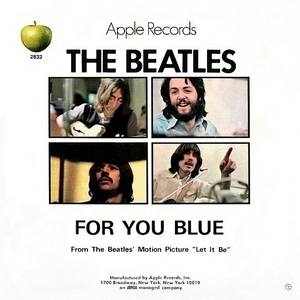
"For You Blue" is a song by the English rock band the Beatles from their 1970 album Let It Be. The track was written by George Harrison as a love song to his wife, Pattie Boyd. It was also the B-side to the "Long and Winding Road" single, issued in many countries, but not Britain, and was listed with that song when the single topped the US Billboard Hot 100 and Canada's national chart in June 1970. On the Cash Box Top 100 chart, which measured the US performance of single sides individually, "For You Blue" peaked at number 71.

"Two of Us" is a 1969 song written by Paul McCartney and credited to the Lennon–McCartney partnership. The song was recorded by the Beatles on 31 January 1969.

"Things We Said Today" is a song by the English rock band the Beatles, written by Paul McCartney and credited to Lennon–McCartney. It was released in July 1964 as the B-side to the single "A Hard Day's Night" and on their album of the same name, except in North America, where it appeared on the album Something New. The band recorded the song twice for BBC Radio and regularly performed an abbreviated version during their 1964 North American tour.

"Dig a Pony" is a song by the English rock band the Beatles from their 1970 album Let It Be. It was written by John Lennon and credited to Lennon–McCartney. The band recorded the song on 30 January 1969, during their rooftop concert at the Apple Corps building on Savile Row in central London.

"You Never Give Me Your Money" is a song by the English rock band the Beatles. It was written by Paul McCartney, and thematically documents the personal difficulties that were facing the band. The song is the first part of the medley on side two of their 1969 album Abbey Road and was recorded in stages between May and August that year.
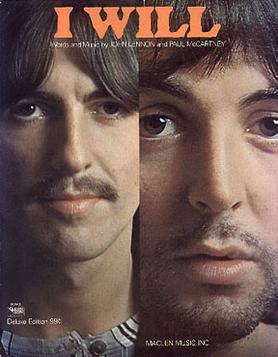
"I Will" is a song by the English rock band the Beatles, from their 1968 double album The Beatles. It was written by Paul McCartney and features him on lead vocal, guitar, and "vocal bass".

"Everybody's Got Something to Hide Except Me and My Monkey" is a song by the English rock band the Beatles from their 1968 double album The Beatles. It was written by John Lennon and credited to Lennon–McCartney. The lyrics contain sayings the Beatles heard from Maharishi Mahesh Yogi, with whom they studied Transcendental Meditation in India in early 1968. In his subsequent comments on the song, Lennon said it addressed his bandmates' initial reaction to his relationship with Yoko Ono. Recorded early in the sessions for the White Album, the track typifies Lennon and the Beatles' return to a rock sound in 1968 after their psychedelic period.
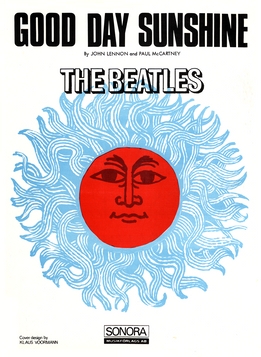
"Good Day Sunshine" is a song by the English rock band the Beatles from their 1966 album Revolver. It was written mainly by Paul McCartney and credited to the Lennon–McCartney partnership. McCartney intended it as a song in the style of the Lovin' Spoonful's contemporaneous hit single "Daydream". The recording includes multiple pianos played in the barrelhouse style and evokes a vaudevillian mood.

"I'm Looking Through You" is a song by the English rock band the Beatles from their 1965 album Rubber Soul. It was written by Paul McCartney and credited to Lennon–McCartney. McCartney wrote the song about English actress Jane Asher, his girlfriend for much of the 1960s, and her refusal to give up her stage career and focus on his needs. The line "You don't look different, but you have changed" reflects his dissatisfaction with their relationship. The lyrics also refer to his changing emotional state: "Love has a nasty habit of disappearing overnight".

"You're Going to Lose That Girl" is a song by the English rock band the Beatles from their 1965 album and film Help! Credited to the Lennon–McCartney songwriting partnership, the song was mostly written by John Lennon with contributions from Paul McCartney.
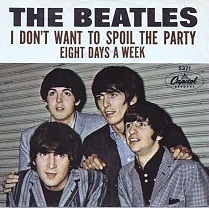
"I Don't Want to Spoil the Party" is a song by the English rock band the Beatles, written by John Lennon and credited to Lennon–McCartney. It was featured as the twelfth track on the 1964 album Beatles for Sale. "I Don't Want to Spoil the Party" was also released on the Beatles for Sale EP. It was later released as the B-side of the US single "Eight Days a Week", and then as the fifth track on the North America-only album Beatles VI. The song reached number 39 on the Billboard Hot 100.

"Old Brown Shoe" is a song by the English rock band the Beatles. Written by George Harrison, the group's lead guitarist, it was released on a non-album single in May 1969, as the B-side to "The Ballad of John and Yoko". The song was subsequently included on the band's compilation albums Hey Jude, 1967–1970 and Past Masters, Volume Two. Although "Old Brown Shoe" remains a relatively obscure song in the band's catalogue, several music critics view it as one of Harrison's best compositions from the Beatles era and especially admire his guitar solo on the track.
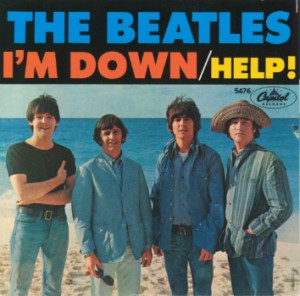
"I'm Down" is a song by the English rock band the Beatles, written by Paul McCartney and credited to Lennon–McCartney. It was released on a non-album single as the B-side to "Help!" in July 1965. The song originated in McCartney's attempt to write a song in the style of Little Richard, whose song "Long Tall Sally" the band regularly covered.

"Don't Let Me Down" is a song by the English rock band the Beatles, recorded in 1969 during the Let It Be sessions. It was written by John Lennon and credited to the Lennon–McCartney songwriting partnership. The band recorded the song with keyboardist Billy Preston; the single release with "Get Back" was credited to "the Beatles with Billy Preston". Originally released as a B-side, producer Phil Spector excluded the song from Let It Be. The song's first appearance on an album was on the 1970 collection Hey Jude.

"In Spite of All the Danger" is the first song recorded by the Quarrymen, then consisting of John Lennon, Paul McCartney, George Harrison, pianist John Lowe, and drummer Colin Hanton.
"I'll Be on My Way" is a song written by Paul McCartney, credited to Lennon–McCartney, first released on 26 April 1963 by Billy J. Kramer with the Dakotas as the B-side of their hit debut single "Do You Want to Know a Secret", a song also written by Lennon–McCartney. The single reached number two in the UK charts while "From Me to You" by the Beatles occupied the number 1 position. The Beatles recorded a version of the song on 4 April 1963 for BBC radio, first released on the 1994 compilation album Live at the BBC.
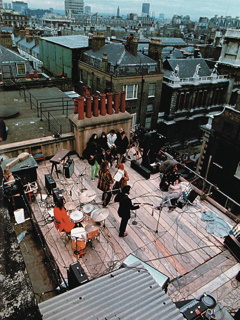
On 30 January 1969, The Beatles performed a concert from the rooftop of their Apple Corps headquarters at 3 Savile Row, in central London's office and fashion district. Joined by guest keyboardist Billy Preston, the band played a 42-minute set before the Metropolitan Police arrived and ordered them to reduce the volume. It was the final public performance of their career. They performed nine takes of five new songs as crowds of onlookers, many on lunch breaks, congregated in the streets and on the rooftops of nearby buildings to listen. The concert ended with "Get Back", and John Lennon joking, "I'd like to say thank you on behalf of the group and ourselves, and I hope we've passed the audition."
















